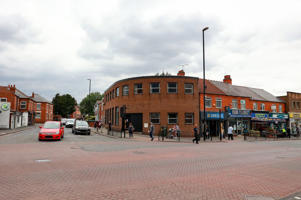
© Tristan Potter The old Barclays in Ball Hill is set to become a slots arcade – the street’s 4th gambling venue
A gambling business can now open a branch in one of Coventry’s most deprived areas despite an outcry against the “exploitative” scheme. Merkur Group will turn the old Barclays on Walsgrave Road in Stoke into an adult gaming centre after their bid for a bingo licence was granted today.
Residents had opposed the application because they didn’t want a fourth gambling venue on their street and feared it would add to locals’ crime and money woes. But members of Coventry City Council‘s Licensing Sub-Committee could not find a reason to turn down the bid and gave the company approval at a hearing yesterday.
Barrister Philip Kolvin KC, representing Merkur, delivered a lengthy argument with seven reasons why the application should be granted. He described Merkur as “a good operator” with a “first class” record on crime and pointed out that local organisations such as the police hadn’t objected to the application.
READ MORE: Outcry over venue’s ‘exploitative’ bingo licence bid on deprived Coventry road
Booze and children are banned from the gaming centres and late opening hours don’t lead to disorder, according to night-time observations the company has commissioned. Merkur have 220 premises across the UK but they’ve never had a regulatory intervention or hearing to review their licence, he added.
“All that happens is people wander in, usually in ones and twos, and then they wander out again causing no harm to anyone.” Mr Kolvin dismissed some local objections, including those relating to the venue’s location, as not admissible in Gambling Commission guidance.
On how vulnerable people would be protected, he cited staff training at the centres and controls on machine stakes and prizes. Chair of the Sub-Committee Cllr Robert Thay pressed Mr Kolvin and four senior staff at Merkur on the numbers, such as the average stake on machines.
He also asked how staff are able to exclude problem gamblers from the venue – or people who seem in control but spend outside their means. Mr Kolvin said company employees get to know their communities and will spot if a regular is spending more than normal.
Staff are encouraged to be vigilant and if they’re concerned will log customer interactions which are then reviewed by the company’s head office, he said. Large spending sprees are flagged up, Mr Kolvin added, and players can sign voluntary exclusion agreements which ban them for six months from Merkur venues.
The meeting then heard from Mark Heffernan, one of the objectors who lives five minutes from the road. The 60-year-old acknowledged that Mr Kolvin had answered many of his questions, but was still unhappy about the plans.
He fears that people “may use the establishment in a way that may cause them financial hardship further down the road,” – for example, not being able to pay their energy bills or feed their families.
“All I can say is I don’t think it is the right thing for the area, especially in these economic times,” he said. “I’d rather have a foodbank than a gambling establishment in the area.”
But the sub-committee decided to grant the licence based on the evidence heard at the meeting, including the objections. They considered that the applicant demonstrated a willingness to prevent as far as possible any problems and didn’t feel that the objections were under the remit of the law.
READ NEXT: